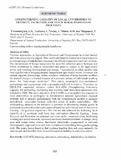| dc.contributor.author | Magomere, T. | |
| dc.contributor.author | Muiru, M.W. | |
| dc.contributor.author | Maina, J | |
| dc.contributor.author | Ambuko, J. | |
| dc.contributor.author | Chemining'wa, G.N. | |
| dc.date.accessioned | 2014-07-15T08:21:42Z | |
| dc.date.available | 2014-07-15T08:21:42Z | |
| dc.date.issued | 2011-09 | |
| dc.identifier.citation | Optimimization of Agricultural Value Chains for sustainable Development | en_US |
| dc.identifier.uri | http://hdl.handle.net/11295/72994 | |
| dc.description | Strengthening capacity of local universities to promote, facilitate and teach rural innovation processes | en_US |
| dc.description.abstract | Previous approaches in Agricultural Research and Development have had limited
and often unsustainable impact. This can be attributed to limited active participation
by a broad range of stakeholders necessary for effective innovation delivery systems.
The Government of Kenya recognizes the need for collective action between and
within institutions to achieve sustainable and positive impact in the agricultural
sector with resulting development and change. Agricultural faculties need to take
their rightful role in bringing desired change in the agricultural sector. However, the
current capacity (knowledge, skills, mindsets, attitudes) of these faculties to effect
the desired changes is limited because of a common culture of individuals working
alone- the "lone-ranger syndrome". This makes meaningful inter-institutional
partnerships and engagement with communities difficult to achieve. Therefore, an
EDULINK supported initiative called SUCAPRl (Strengthening University
Capacity for promoting, facilitating and teaching rural innovation processes) was
initiated in 2008. The main objective of SUCAPRI is to strengthen the capacity of
local universities to participate in decentralised national agricultural research
systems, and to prepare professionals with the competencies needed to promote
agricultural innovation through collective action of multi- stakeholders. The
methodology adopted in the initiative is centered on developing change agents in
participating universities through a series oflearning cycles based both on theories of
learning and practical experience. The initiave has achieved the following: built
capacity of 21 academic staff from four universities (Nairobi, Egerton, Jomo
Kenyatta and Kenyatta) on personal and team skills, communication, facilitating
learning and action research; facilitated multi stakeholder platforms in mango, dairy
goat and potato value chains; facilitated stakeholder engagement in curricula
development; improved intra-and inter-institutional networking among participating
staff. The major lesson learnt is that working together does not come naturally for
most people and therefore there is need for capacity building in collective action. | en_US |
| dc.description.sponsorship | National Council of Science and Technology , The Kenya Seed Company | en_US |
| dc.language.iso | en | en_US |
| dc.publisher | Faculty of Agriculture, University of Nairobi | en_US |
| dc.subject | facilitation | en_US |
| dc.subject | stakeholders, | en_US |
| dc.subject | networking, | en_US |
| dc.subject | innovation, | en_US |
| dc.subject | learning, | en_US |
| dc.subject | SUCAPRl, | en_US |
| dc.title | Strengthening capacity of local universities to promote, facilitate and teach rural innovation processes | en_US |
| dc.type | Presentation | en_US |
| dc.type.material | en | en_US |

